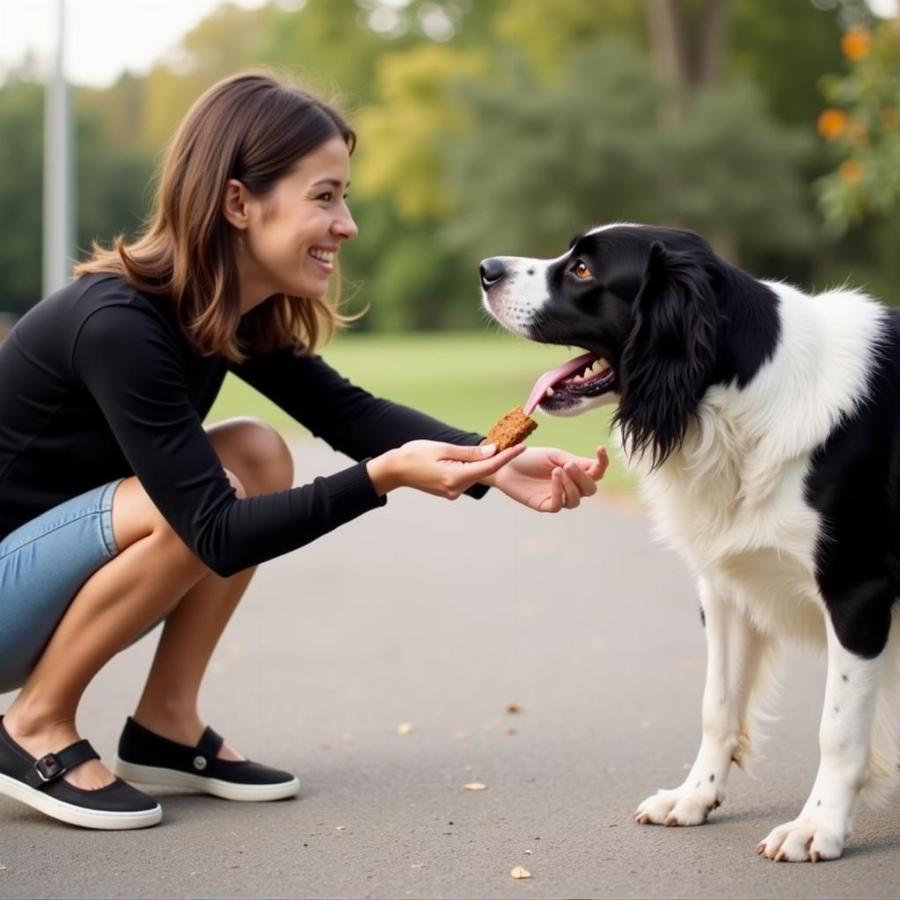Finding out your dog ate maggots can be a horrifying experience for any pet owner. Maggots are fly larvae, commonly found in decaying organic matter like spoiled food or garbage. While not typically life-threatening, eating maggots can pose health risks to your dog, and it’s crucial to know how to respond.
This comprehensive guide will address everything you need to know about dogs eating maggots, from understanding the potential dangers to providing practical solutions and preventative measures.
Why Do Dogs Eat Maggots?
Dogs are naturally curious creatures, often exploring the world through their sense of smell and taste. Their scavenging instincts might lead them to investigate and consume things they find intriguing, including maggots. Here are some common reasons why dogs might eat maggots:
- Attractive Odor: Believe it or not, the smell of decaying matter can be appealing to dogs.
- Food Driven: A dog’s strong scavenging instincts can drive them to eat anything they perceive as food.
- Boredom or Lack of Stimulation: Under-stimulated dogs might resort to unusual behaviors like eating maggots out of boredom.
Are Maggots Harmful to Dogs?
While a few maggots might not cause severe harm, ingesting a large number, especially those found on dead animals, can lead to various health issues for your dog:
- Bacterial Infections: Maggots thrive in bacteria-laden environments, and consuming them can introduce harmful bacteria into your dog’s system, potentially leading to infections.
- Parasites: Maggots can carry parasites like roundworms or tapeworms, which can infest your dog upon ingestion.
- Gastrointestinal Upset: Eating maggots can upset your dog’s stomach, leading to vomiting, diarrhea, and loss of appetite.
- Toxicity: Some species of maggots can be toxic to dogs, causing more severe symptoms like tremors, drooling, or even seizures.
Signs Your Dog Ate Maggots
It’s not always easy to know if your dog has ingested maggots, but some telltale signs might include:
- Vomiting
- Diarrhea
- Loss of appetite
- Lethargy
- Abdominal pain
- Scooting or licking their bottom excessively
What to Do If Your Dog Ate Maggots
If you suspect your dog ate maggots, it’s crucial to contact your veterinarian immediately. They can assess the situation, determine the potential risks, and recommend the best course of action, which might include:
- Inducing Vomiting: In some cases, the vet might induce vomiting to remove the maggots from your dog’s system.
- Medications: Depending on the type and number of maggots ingested, your vet might prescribe medications to treat potential bacterial infections or parasitic infestations.
- Supportive Care: Your vet might recommend supportive care measures like fluid therapy or a bland diet to manage gastrointestinal upset.
Preventing Your Dog from Eating Maggots
Prevention is always better than cure. Here are some proactive steps you can take to minimize the risk of your dog encountering maggots:
- Secure Garbage: Use tightly sealed garbage bins and store them away from your dog’s reach.
- Clean Up Promptly: Dispose of food scraps and clean up spills immediately to prevent attracting flies.
- Monitor Outdoor Areas: Regularly check your yard for dead animals, decaying plants, or any other potential breeding ground for maggots.
- Keep Dog Food Fresh: Store your dog’s food in airtight containers and wash their bowls regularly.
- Train “Leave It” Command: Teach your dog a reliable “leave it” command to deter them from investigating potentially harmful items.
 Dog Training
Dog Training
Expert Insights
“As a veterinarian, I’ve seen numerous cases of dogs experiencing health issues after ingesting maggots,” says Dr. Emily Parker. “It’s crucial to be vigilant about your dog’s environment and take preventative measures to minimize their exposure to these potential hazards. If you suspect your dog has eaten maggots, don’t hesitate to seek immediate veterinary attention.”
Frequently Asked Questions (FAQs)
Q: Can maggots live in a dog’s stomach?
A: While maggots typically can’t survive the acidic environment of a dog’s stomach, they can still pose health risks through bacterial contamination and parasites.
Q: Can I use home remedies if my dog ate maggots?
A: It’s not recommended to use home remedies without consulting your veterinarian. Some home remedies might worsen the situation.
Q: Are all types of maggots harmful to dogs?
A: While most maggots are not inherently toxic, some species can be poisonous to dogs. It’s best to err on the side of caution and contact your vet if your dog ingests any type of maggot.
Q: How long after eating maggots will a dog show symptoms?
A: Symptoms can appear within a few hours or might take a few days to manifest, depending on the quantity and type of maggots ingested.
Q: How can I prevent maggot infestations in my home?
A: Maintaining a clean home environment, properly disposing of garbage, and storing food securely can significantly reduce the risk of maggot infestations.
Need More Help?
For additional information and personalized guidance on dog care, visit Beaut Dogs. If you need specific support regarding your furry friend, reach out to us at [email protected] for detailed and accurate answers. We’re here to help you provide the best possible care for your canine companion.